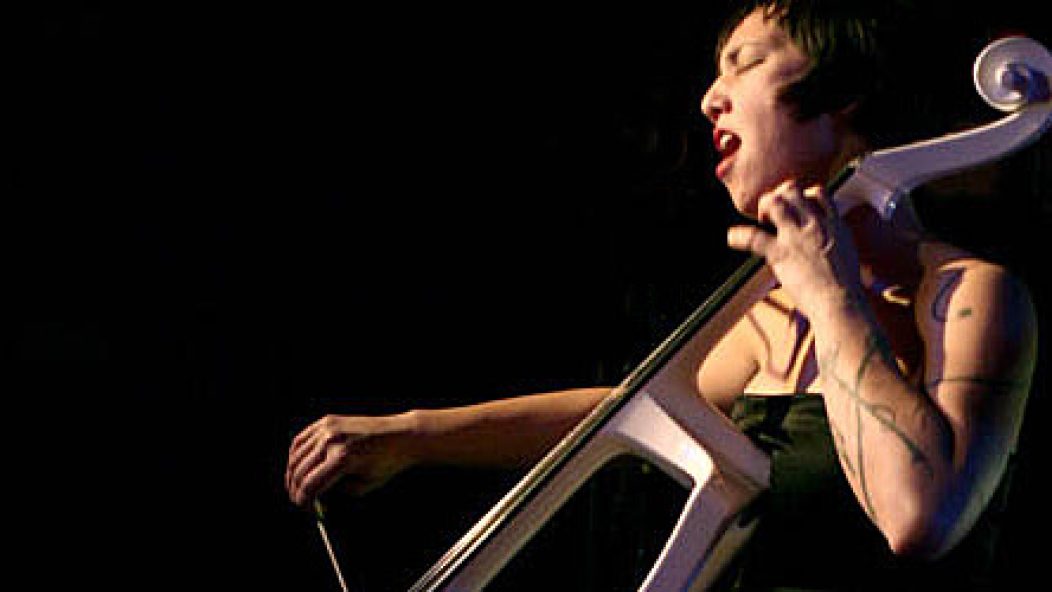
Interview: Jackie Perez Gratz (Grayceon)
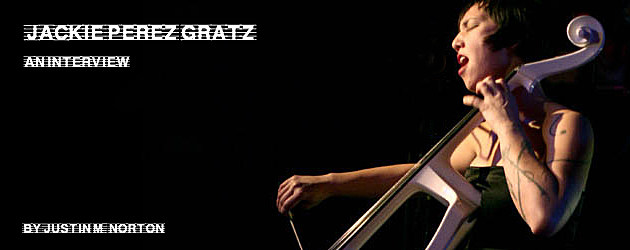
If you know people who think metal is one-dimensional, tell them about Jackie Perez Gratz. A quick overview: cellist and vocalist for San Francisco metal trio Grayceon; cellist-for-hire for bands including Neurosis, Cattle Decapitation, Agalloch, and many others; and one-time photography student. She plays with Giant Squid, namechecks classical composers with ease, and has an effusive laugh. Grayceon, which features guitarist Max Doyle and drummer Zack Farwell of thrashers Walken, formed at a New Year’s Eve party. They released their third album All We Destroy on Profound Lore in March. Gratz spoke to us before a Friday afternoon drive to play a college campus. She shared her story and talked about her eternal love for Guns N’ Roses.
. . .
What came first for you, the cello or metal?
Playing cello. My parents are trained classical musicians. I grew up around orchestras and a lot of adults who played instruments. When I was seven, about second grade, I just said one day that I wanted to play cello. Since they were musicians, they decided to help. I got the instrument and started private lessons. But I wasn’t listening to metal at age seven, unfortunately.
If you had come home with a copy of Iron Maiden’s Killers, how would two classically trained musicians have reacted?
As a teenager, I threw on a lot of different music in the car, and they were pretty open to stuff. I was interested to see what they would like most in my collection. My dad tended to go more for the ’80s stuff like Depeche Mode. They seem to think now that my music is a little strange. I certainly appreciate classical music, but I’m not so sure that classical musicians are that open to listening to metal.
Did you go to a high school for the performing arts?
I did. I went to Roosevelt School of the Arts. I studied photography and the orchestra and drama. I remember not wanting to go to that school when I was younger because no one in my middle school was going there. In retrospect, I’m really glad I went. It was so much more diverse. At that point, I’d already been playing music for almost a decade.
Why is that when I think of performing arts school, I think of Fame, with people dancing in the hallways and jumping out of lockers?
Well, that’s kind of how it is. It’s glamorized more in Fame, but there are always kids practicing in the hall or talking about their instruments. It’s an interesting environment to be in, for sure.
Were there any headbangers in your school?
Roosevelt was a magnet school in Fresno, CA. Because it was one of the oldest schools, it was also in one of the poorest neighborhoods. The regular students there were very different than all the performing arts students. There were definitely headbangers. I always remember them as the bad kids smoking on the other side of the fence.
Did you ever think those kids would be your bandmates as an adult?
(Laughs) No, I had no idea. I kept the music I was listening to and the music I was playing separate until much later. It wasn’t until I was almost out of college that I got into bands. I was studying photography in college and hadn’t picked up the cello in a while. After I finished college, I realized I really missed playing. That’s when I discovered I could do both things: the instruments I had been trained on and heavier music.
. . .
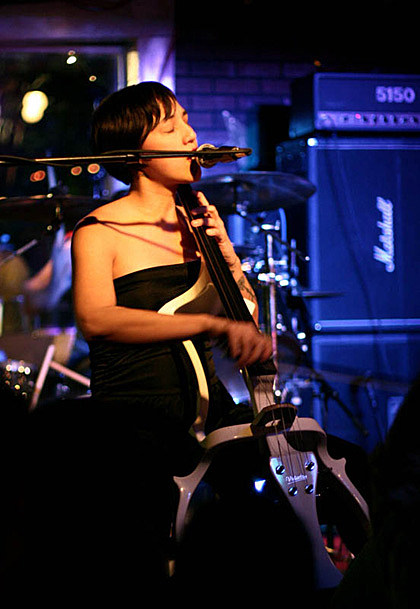
. . .
How did growing up in California’s Central Valley contribute to your musical development?
Fresno, like any other suburb, doesn’t have that much culture. There are a lot of shopping malls and parking lots. It would even be crazy to see people walking on the side of the road because everyone was in their car shuttling around. For some reason, Fresno has a very big classical music program in their school district and a decent orchestra. It’s kind of the only culture going on. It’s probably why my parents moved there, because they both played in symphonies, and they conduct youth orchestras. I haven’t lived there for years, but I think it’s an anomaly. I don’t think most places in the Central Valley have that kind of culture. It’s random that my school district had this amazing classical music program.
You hear about metal listeners who go backwards and discover classical or blues, but you heard classical first and then discovered metal.
When I was younger, I listened to metal and classical, and I never thought classical was heavy in the same way. Now that I play metal, I can listen to those old pieces – the classical pieces – and realize it’s really heavy. I understand how metalheads who have never heard classical music can put on a symphony and have their minds explode.
Stravinsky wrote music about someone who makes a deal with the devil (“The Soldier’s Tale”), and Berlioz’ music is incredibly fiery and emotional. There are the same sorts of emotions in metal.
Definitely, and not just Berlioz. There are so many symphonies about torture and death or something heavy or emotional. The content is very similar.
What was the first metal album you fell in love with?
Appetite for Destruction. I still have this tape – one of those clear cassettes – with all of the ink rubbed off because it was played over and over on repeat. That was the first heavy album that got me interested in the music.
How did Grayceon get together?
Max and Zack came to my house for a New Year’s party. They play together in Walken. Max had all of these proggy riffs that he didn’t want to bring to Walken. They started jamming and enjoyed what they were writing. So when they were at my house, they asked if I wanted to play. I told them what I ask everyone who wants me to play with them: give me a tape or something I can listen to so I can tell you if I’m into it. A lot of people seem to want a cello in their band. But I need to be serious about it, and for people to be proud of what they are working on and want to share it. I don’t want to go in blind to some rehearsal and discover that I hate the music. I’m not asking for something super-professional, just an idea.
They later showed up with a CD recorded in the studio just for the purpose of getting me in their band. I was so charmed. And I really grooved on what they were working on, and I felt there was a lot of room for me to grow. I instantly heard cello to it. We fell in love with the project quickly.
Do you practice in a place where you’d be more likely to see someone carrying a violin case or a six-pack?
A six-pack, for sure. It’s a huge studio with, like, 90-plus rooms in a commercial area of San Francisco. It’s a beehive for bands. I’ve been playing there since 1997. It’s the place where all the magic happens. I have seen some classical instruments there on occasion.
. . .
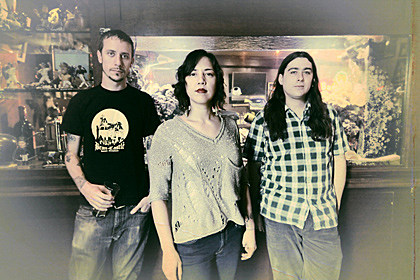
. . .
People make a big deal about having a cello in metal, but in Grayceon’s music it seems as much of a part of the package as the guitar. It’s something that’s always there.
It’s not there for shtick. The three of us are friends who love to collaborate, and I happen to play cello. If I played a different instrument, we would have still come together. We don’t treat ourselves different or write songs different because we have the cello. It’s sort of a non-issue.
There was a recent review that referred to Grayceon’s music as the “Cellopocalypse”.
Yeah, I saw that (sighs). There are a lot of bands that are coming out that have cello now, heavier bands. It seems to be getting popular. The fact that people are using the term “cello metal” is scary to me. I don’t want us put into a category as a band. I don’t want to be a part of that. But we do have a cello in the band, so…
Some listeners say All We Destroy contains songs about love gone bad. Others have read anti-war statements into your lyrics. Which is it?
All of the above. I like to use double meanings, and everything I write about is from personal experience. The album is in some sense about how new beginnings are possible. That’s not to say it doesn’t deal with anger and desperate measures and emotions. But I definitely feel it’s kind of hopeful in the end. There are love songs. But they are love songs about how things will fall apart. “We Can” is sort of like that, and so is “Shellmounds”. Still, there is some element of hope, a feeling that you can let go and move on.
Were any personal experiences an inspiration for these songs?
I’d gone through a really bad breakup around the time we were writing This Grand Show. It took a long time for me to snap out of the depression and this general fear that the world was against me. Now I’ve started with my own new beginnings, and I feel more thoughtful. I’m more protective of my own emotions. There’s a certain level of pessimism that runs through me, but also hope.
How would you characterize your vocals? Did you study singing in addition to cello?
I loved to sing when I was little. I think my dad wanted me to study singing, but I’m not sure I was interested. I was always such a loud talker. I’d get in trouble in classes, and my friends would think I was talking too loud. I have a gargantuan voice that would suit itself to opera.
I never studied singing until I started playing with Grayceon. I didn’t want to be an instrumental band. Max and I started taking vocal lessons. If you listen to our last album, the vocals are very different.
I stopped lessons because I didn’t have time or money. But I continued to work on different styles of singing. I knew that where I started wasn’t where I wanted to end. Initially, I think I was writing poorly for my vocal range. Now I feel like I’m getting more in tune with what my voice is capable of rather than wishing my voice was crazy high. I think it’s nice to have a range of vocals.
. . .
Perez Gratz on what makes the Bay Area metal scene special
[audio: GRAYCEON_JACKIE_BAYAREASCENE.mp3]
. . .
You are heading to play a showcase at Cal State Monterey tonight. Has Grayceon’s approach allowed you to be booked in different types of locations and venues than just traditional metal clubs?
Yes. It’s interesting because we always get a different reception. But we’re able to play these indie rock or regular rock shows. We’ll be the heaviest thing they ever heard because they are expecting indie rock. If we are booked with a straight-up metal bill, the audience might not think we’re that metal. It does keep things interesting.
As someone who spent a lot of time practicing and played for years, what’s more important, time spent in the woodshed learning your craft, or intuition and feel?
You need both. I think one of the reasons Grayceon works is we are very consistent with writing and performing. We don’t take breaks. There’s always a constant flow of us working on our craft. We also go to a lot of shows together in the Bay Area. So we write music and let other things influence us. I think it’s equally important.
In your day life, you are an audio artist for the video game maker Electronic Arts. What does your job involve?
I work on The Sims. I’m a producer. I’m not writing music for the game. But I definitely have some sense of creative direction, like determining where sounds or music should go in the game. When music gets created, I’m the one putting it in the game. I think it’s good I’m not a sound designer or writing music. It would be a little too close to my own music-making.
Since you worked with EA, did you have anything to do with the music John Cobett wrote for The Sims?
No, but I remember when my co-workers were talking about hiring him. I told them he would be perfect. I heard all the stuff that came in, and it is pretty fabulous.
Video games often focus on single songs; I’m thinking back to when Grand Theft Auto 2 revived interest in A Flock of Seagulls’ “I Ran”. Grayceon is very much music meant to be listened to in an album format.
That disconnect is happening in music in general. I prefer listening to vinyl. But the majority of people don’t put in a CD and listen to it. The majority of people are shuffling or listening to playlists on their personal devices. It concerns me. I write albums to be listened to as albums. But you can’t help how people listen to your stuff. A lot of the music used for video games is hit singles, the radio hits. The whole marketing placement of music for video games is relatively new. It’s definitely good for video games, but I’m not sure it’s good for music or artists.
. . .
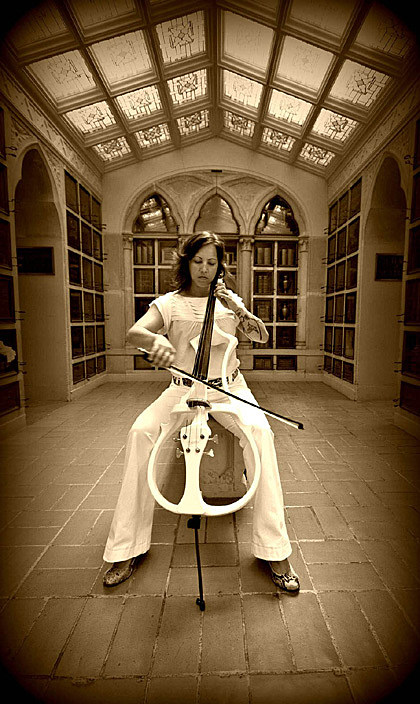
. . .
But if a Grayceon song were purchased and used by a big developer, the royalties might allow you to do a lengthier tour.
That’s true. I think if we were presented with a commercial opportunity, we’d probably go for it. I know there are some musicians who would disagree and want to keep themselves at an underground level. But no doubt doing a commercial project would allow us to go to Europe another time or hire some super-producer for another album.
Scion A/V started a label and signed a few underground metal bands. The bands argued that they got to record for free and retained the album rights. All they needed to do was have a Scion stamp on the initial release.
The digitization of music has led to a lot of changes. Companies like Scion are trying to find a way to get into the industry. I’m not sure we would do something like that. But that doesn’t sound too onerous, or that they are taking advantage of the artist. That sounds more like a symbiotic relationship.
The label you are on, Profound Lore, is sort of bucking these trends by putting out a roster of artists that consistently produce interesting music.
We’re really excited to be on Profound Lore. It’s an honor to be a part of their roster. I see Chris Bruni more like the art director of a gallery. He’ll only put art on the walls from artists he believes in. I feel like labels have lost that. There’s a lot less nurturing of bands from the beginning. But Chris takes such special care with what he puts out, and it seems more cohesive. It helps because people trust what he’s putting out and his opinion.
How did you end up working with Neurosis?
Kris (Force) from Amber Asylum was in a relationship with Steve Von Till for several years. She’d been playing violin on their albums from the beginning. I also knew a few other members through different avenues. They are all great guys, fun to hang out and record with. They know how they want things to sound. It’s hard to be a hired gun. But they have a clear vision of what they want, and it was very helpful for recording. They are also perfectionists. I have a lot of respect for that. They always made sure the performances were consistent and [that] they had enough takes.
They were among the first metal bands to take the risks that led to bands like yours.
When alternative was no longer alternative, they were the new alternative. They opened so many doors for bands like mine and bands doing stuff on the fringes. Bands like Neurosis also give you hope that you can grow and become well-known without becoming a commercial sellout.
You can only own one metal album and one classical album. What are they?
That’s so hard. Appetite for Destruction remains one of my favorites, but I’d have to say Judas Priest’s Sad Wings of Destiny. Classical, I don’t know. Maybe the Bach cello suites, but that’s not going to fill one album.
Who is your favorite cellist?
Yo-Yo Ma. I know it sounds cliché, but I’ve been listening to him play since before he was famous. He makes it seem so easy, like brushing your teeth.
. . .
HEAR ALL WE DESTROY
– Full album stream –
. . .
BUY ALL WE DESTROY
Amazon (CD)
Amazon (MP3)
Profound Lore (CD)
. . .






